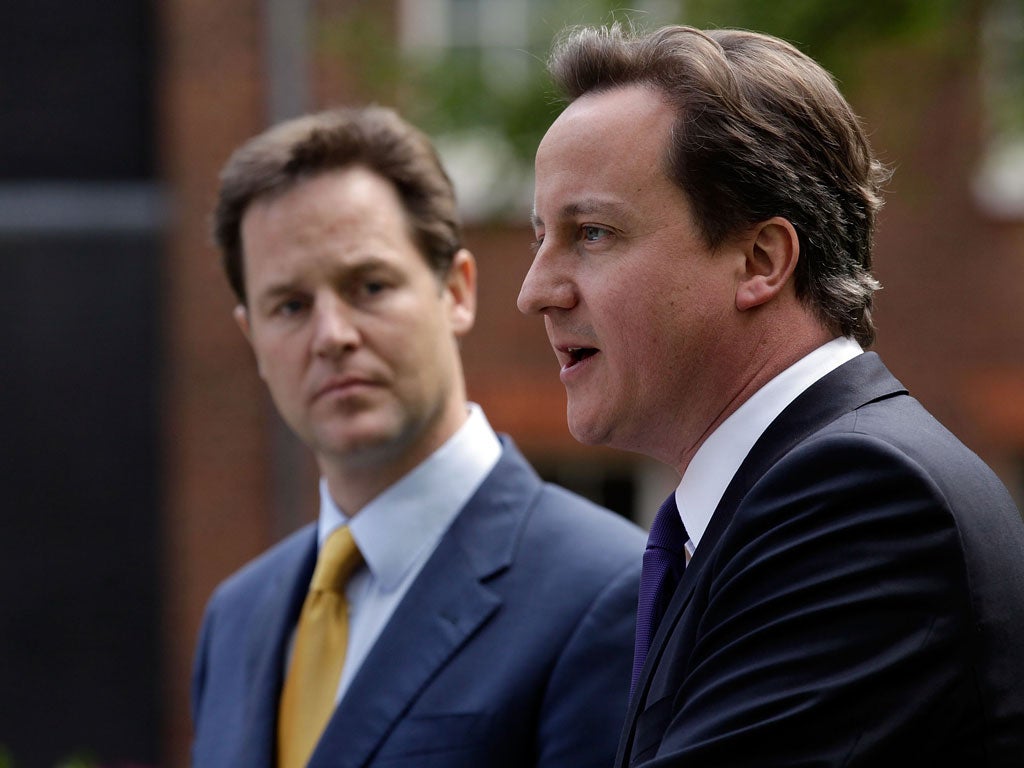Andrew Grice: Has the Coalition charabanc reached a fork in the road?
Inside Westminster: Clegg has to show that coalition works. Flouncing out would undermine that


"How long will the Coalition last?" It's the great guessing game in the Westminster village, an obsession for politicians, advisers and other inmates like me. On the face of it, the speculation is premature: we're not yet halfway through the five-year Parliament due to end in May 2015.
Strangely, some MPs seem to have forgotten they passed the Fixed-term Parliaments Act last year, which requires two-thirds of MPs to vote for a general election. This would require both Conservative and Labour MPs to support an election – an unlikely prospect. So Tory threats of an early election, occasionally thrown around like crockery within the Coalition's marriage of inconvenience, are pretty empty, especially when Mr Cameron's party trails in the polls and there's no sign of the economy picking up.
It's all part of "July madness", a Westminster tradition which saw MPs depart for their summer break this week in a tetchy and fractious mood. The Tory backbench rebellion over House of Lords reform has changed the dynamics inside the Coalition and the Conservative Party.
A double unity parade, by David Cameron and Nick Clegg on Monday and George Osborne and Danny Alexander two days later, masked real tension behind the scenes. The trouble at the top — triggered by Mr Cameron's failure to deliver enough Tory support to allow Mr Clegg's Lords blueprint to progress — has trickled down, even causing grief in departments where the Coalition parties normally work well together. "The atmosphere is different," one Tory minister admitted.
More worrying for Mr Cameron is the mutiny on his own backbenches. "He has lost control of his own troops," one Tory rebel said. "For many of us, it wasn't really about the Lords. It was about him. He has lost his authority." While the election looks a safe bet for May 2015, that doesn't mean a full-scale Coalition will last until then. There is growing clamour amongst Tory MPs to move to a "confidence and supply" arrangement, under which the Liberal Democrats would not have to vote for all the Tories' policies but would back them in key votes such as the Budget and confidence motions.
The black mood of Tory MPs has affected the answers to the Coalition shelf-life question. My straw poll of Tory ministers produced a range of predictions, from ending in early 2013; the autumn party conference season of 2013 or 2014 to Christmas 2014. However, my mini-survey of Liberal Democrat ministers found them more optimistic the Coalition would last until the 2015 election or shortly before it. Perhaps that's natural: they would lose their ministerial posts under "confidence and supply". "The Lib Dem ministers love their red boxes and limos," a Tory counterpart quipped. Clegg allies insist it is not about power or perks, his party must show that "coalition works". Flouncing out early would undermine that. "Any reward for taking the tough decisions on the economy would be lost; we would look flaky," one aide said.
But staying the course, will not be easy. Although the parties agree they will diverge in the year before the election as they set out their respective stall, managing them is going to get harder for the two leaders.
The crunch issue is the next government-wide spending review. The Tories want to target the welfare budget; the Liberal Democrats' instinct is to tax the rich. There are conflicting Treasury signals about when the review will be held. That has fuelled speculation that a full-scale review will be put off until after polling day.
Under pressure from his MPs, Mr Cameron will be tempted to veer right. That might not appeal to centrist voters he needs to woo. Yesterday, polling funded by Lord Ashcroft, the Tories' former deputy chairman, showed 51 per cent want the Liberal Democrats to have more influence, while only 23 per cent say they have too much sway – a ray of hope for Mr Clegg, who believes his party must "drive right down the middle of the road".
How long will he remain in the same vehicle as Mr Cameron? They want the Coalition to last the course, but the crucial impasse over spending reminds them that they head two very different parties. The fork in the road may arrive quicker than they think.

Join our commenting forum
Join thought-provoking conversations, follow other Independent readers and see their replies